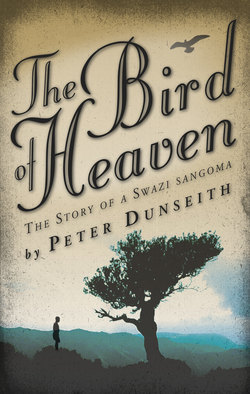Читать книгу The Bird of Heaven - Peter Dunseith - Страница 9
На сайте Литреса книга снята с продажи.
5
ОглавлениеMandla grew his hair long, twisting it with red clay so that it hung down to his shoulders in heavy locks. It made him look older than his years, and with his high cheekbones, golden-brown complexion and piercing dark eyes he was a handsome boy. The female apprentices were fond of him and treated him like a favourite younger brother, much to the annoyance of the envious Sidumo.
The apprentices were taught how to diagnose the cause of an illness by throwing the bones. Although they spoke of “bones”, various tools could be used. Many tangoma used a variety of small bones and shells, some even used the hooves of various animals. The eldest apprentice, Jabu, used pieces of wood on which different markings had been burnt with a hot leadwood coal. She threw the pieces onto a small mat and interpreted the symbols from the way they lay in relation to each other. Each symbol had its own meaning and the Ancestors spoke to Jabu through the mystic patterns they created. In contrast, Logwaja liked to throw the seeds of different trees and creepers, whilst Sidumo’s muti bag contained a collection of teeth – a yellow handful of sharp fangs from wildcats, monkeys and dogs. There was also a huge crocodile tooth, and even a few human ones, which Sidumo boasted that he had stolen from a royal burial cave in the mountains near Zombodze.
Mandla learned the secret meanings hidden in all these tools, yet he wasn’t satisfied. He hadn’t yet found the divination tool that could open his mind to the hidden knowledge. When Grandmother threw her bones she saw a complete story: past, present and future. The cause of the patient’s problem was laid before her and soon she would be scolding, counselling and comforting the patient in equal turns, a monologue punctuated only by frequent shakes of her lishoba.
When Mandla threw the bones he borrowed from Grandmother he could make out the signs of illness or death and the patterns which spoke of relations, money, luck, accidents and witchcraft. Yet still he struggled to make out the full story that a proper diagnosis required. It was as though some kind of fog obscured his inner vision.
“You need to find your own sikhwama,” Grandmother explained. “All the other apprentices have theirs, but I thought you were still too young for such a journey.”
“What is this sikhwama, Gogo?” Mandla asked.
“It’s the bag in which a sangoma keeps his muti and his bones. It is also the symbol of his power. Every true sangoma must have a sikhwama.”
“Where is my muti bag to be found, Gogo? Is it something I must buy?”
“No, my child, a true muti bag can never be bought. It must be inherited. It is given to you by your guardian spirit, along with his power and protection.”
The boy thought about this for a moment. “Does that mean I have to go to the spirit world to fetch my bag?” he finally asked. “You always say that we must meet the spirits in their world, as they cannot set foot in this land?”
Grandmother shook her head. “The guardian spirit of a sangoma was himself a sangoma in his lifetime. When he died his sikhwama was hidden according to tradition. Once he selects his mystic heir, he guides you from within to the hidden place where you will find your inheritance. So long as you have his muti bag he is bound to you by a bond of power and he cannot progress from the shadowland of the Ancestors until you yourself have ceased to be a sangoma.”
“Who then is my guardian spirit, Gogo? Is it my father?”
“No, child, he is greater than your father, he is greater than all of us. You shall know him soon enough. When the moon is empty, two days from now, you shall spend the night in the Indumba. There you will meet Lunwabu, the chameleon sorcerer.”
